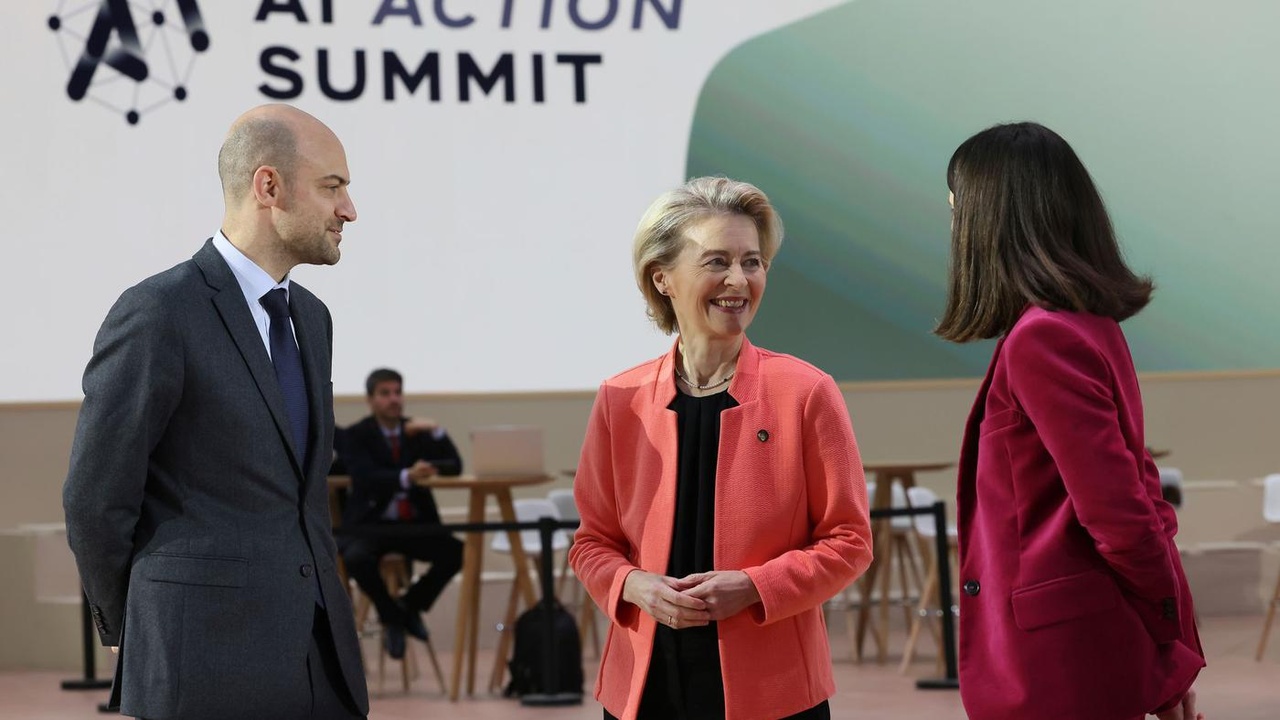Europe wants to get involved in artificial intelligence by investing billions. In addition to leadership in technology, the AI summit in Paris is also about the contentious issue of regulation.
Dear all, which European companies are at the forefront here?
$SIE (-0,45%) I hear they're getting a lot out of the pot.
At the end of the international AI Action Summit in Paris, around 60 countries worldwide are calling for the transparent and sustainable use of artificial intelligence with internationally applicable regulations. This is stated in the final document of the two-day summit with around 1,500 participants from around 100 countries, which was signed by Germany, the EU and China, among others - but not the USA and the UK. At the summit, high investments worth billions in AI were announced and the issue of regulation was debated.
EU Commission President Ursula von der Leyen promised billions in support for the AI sector in Europe. Artificial intelligence (AI) will improve healthcare, drive research and innovation and increase competitiveness, the German politician announced. In Paris, she announced that the so-called InvestAI initiative would be increased by 50 billion euros.
Billions in investment planned worldwide
At the summit in France, more than 60 well-known European companies had previously joined forces in an initiative to promote the development and application of artificial intelligence in Europe. More than 20 major international investors have earmarked 150 billion euros for AI-related projects in Europe over the next five years, it was reported.
A lot of money is also being invested in the USA: OpenAI and major technology partners want to invest 500 billion dollars in new AI data centers in the Stargate program. In France, companies want to invest around 109 billion euros in the expansion of AI infrastructure, said President Emmanuel Macron.
European start-ups are lagging behind
So far, only a few players from Europe have made a name for themselves in the AI sector. The industry leaders are based in the USA, but there is also competition in China. The European AI start-up Mistral AI from France mainly develops open source language models. Its German counterpart Aleph Alpha has largely abandoned the development of its own large language model and is focusing on specific AI solutions for corporate customers and public sector clients.
At the AI Summit, US Vice President J.D. Vance spoke out against strict regulation of artificial intelligence. "To restrict its development now (...) would be to paralyze one of the most promising technologies in generations," said the Republican. Vance says that we want to cooperate and be open when it comes to AI. "But to build that trust, we need international regulatory systems that encourage the creation of AI technologies rather than stifling them." Europe in particular needs to look at AI with optimism rather than trepidation.
USA and UK do not sign final declaration
Like the USA, the UK did not sign the final declaration of the Paris summit. "We did not sign the declaration because it does not reflect the UK's policy positions on opportunity and security," a government spokesperson told the British news agency PA. The decision had nothing to do with the USA.
Prime Minister Keir Starmer, who has been in government with the Social Democratic Labor Party since the summer, recently promoted the opportunities offered by artificial intelligence and said that his country would become an "AI superpower" thanks to billions in investment.
Scholz calls for clear rules for AI
Meanwhile, at a reception at the Élysée Palace, German Chancellor Olaf Scholz (SPD) spoke out in favor of clear rules for the use of AI, as the technology not only holds potential but also risks. In order to promote the acceptance of AI technologies, rules are needed that must be implemented in an innovative and future-oriented manner. This should also be the guiding principle when applying the EU's AI Act. At the beginning of February, the EU enacted the AI Act, the world's first cross-national legislation on the use of artificial intelligence.
In Paris, UN Secretary-General António Guterres urged that artificial intelligence (AI) should not only benefit industrialized countries, but also developing countries. "While some companies and countries are entering a rapid race with unprecedented investments, most developing nations are being left behind. This increasing concentration of capacities in the field of artificial intelligence threatens to exacerbate the geopolitical divide," said the UN chief.
Energy requirements are the crux of AI
At the Paris meeting, participants were also concerned about the energy requirements of artificial intelligence. As the Director of the International Energy Agency (IEA), Fatih Birol, said, a medium-sized data center consumes as much electricity as 100,000 households. AI companies rightly want a secure, affordable and sustainable power supply. Countries that have this are one step ahead of the others. Delays and cancellations in the construction of data centers are imminent if the expansion of the power supply drags on. However, AI could also help to optimize power systems and increase efficiency, said the IEA chief.
© dpa-infocom, dpa:250211-930-371555/3



